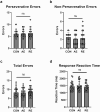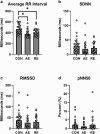Acute exercise impacts heart rate variability but not cognitive flexibility during subsequent simulated firefighter occupational tasks
- PMID: 39537898
- PMCID: PMC11950049
- DOI: 10.1007/s00421-024-05650-9
Acute exercise impacts heart rate variability but not cognitive flexibility during subsequent simulated firefighter occupational tasks
Abstract
Purpose: Acute exercise can transiently enhance cognitive flexibility. The cognitive demand of firefighters makes it relevant to understand if on-shift exercise could produce similar improvements in cognitive performance during subsequent occupational tasks. Metrics of heart rate variability (HRV), such as time- and frequency-domain outcomes, may shed light upon the influence exercise has on cognition, as they discern information related to cardiac autonomic (sympathetic/parasympathetic) function. We aimed to determine if acute resistance and aerobic exercise impact cognitive flexibility during occupational tasks and its relation to HRV.
Methods: 32 participants completed a baseline Wisconsin Card Sorting Task (WCST) and three experimental trials: resistance exercise (RE), aerobic exercise (AE), or a rested control (CON). An occupational task assessment (OTA) including four rounds of 10 deadlifts and a 0.15-mile sandbag carry in an environmental chamber (35 °C/50% humidity) was completed after each trial. The second round was followed by the WCST. Repeated measures ANOVAs were used to analyze differences by condition.
Results: For the WCST, total, perseverative, and non-perseverative errors did not differ (ps > 0.39). Time-domain HRV metrics were not different (ps > 0.05). All frequency-domain metrics, other than low-frequency power, were not different (ps > 0.24). Low-frequency power was lower based on condition (p = 0.03). Post hoc analysis showed low-frequency power was lower following AE compared to RE and CON.
Conclusion: Results suggest an acute bout of on-shift aerobic or resistance exercise may not impact cognitive flexibility during subsequent simulated occupational tasks, despite depressed metrics of heart rate variability following aerobic exercise.
Keywords: Executive function; Heart rate variability; Heat stress; High-intensity interval training; Resistance training; Tactical athletes.
© 2024. The Author(s).
Conflict of interest statement
Declarations. Ethical approval: Approval was obtained from the ethics committee of XX University (protocol code #22-479 AR 2211) and all study procedures adhere to the tenets of the Declaration of Helsinki. Conflict of interest: The authors report no conflicts of interest.
Figures




Similar articles
-
The Effect of Fitness on Performance, Exertion, and Cognition During Simulated Firefighter Occupational Tasks.J Funct Morphol Kinesiol. 2025 Apr 11;10(2):129. doi: 10.3390/jfmk10020129. J Funct Morphol Kinesiol. 2025. PMID: 40566425 Free PMC article.
-
Impact of acute exercise on performance and physiological stress during simulated firefighter occupational tasks.Sci Rep. 2024 Nov 30;14(1):29778. doi: 10.1038/s41598-024-81015-8. Sci Rep. 2024. PMID: 39616210 Free PMC article.
-
Evaluation of circuit-training intensity for firefighters.J Strength Cond Res. 2011 Oct;25(10):2895-901. doi: 10.1519/JSC.0b013e31820da00c. J Strength Cond Res. 2011. PMID: 21873900
-
Considerations for using the Wisconsin Card Sorting Test to assess cognitive flexibility.Behav Res Methods. 2021 Oct;53(5):2083-2091. doi: 10.3758/s13428-021-01551-3. Epub 2021 Mar 22. Behav Res Methods. 2021. PMID: 33754321 Review.
-
[The Effect of Exercise Training on Heart Rate Variability in Patients With Hemodialysis: A Systematic Review].Hu Li Za Zhi. 2019 Feb;66(1):70-83. doi: 10.6224/JN.201902_66(1).09. Hu Li Za Zhi. 2019. PMID: 30648247 Chinese.
Cited by
-
The Effect of Fitness on Performance, Exertion, and Cognition During Simulated Firefighter Occupational Tasks.J Funct Morphol Kinesiol. 2025 Apr 11;10(2):129. doi: 10.3390/jfmk10020129. J Funct Morphol Kinesiol. 2025. PMID: 40566425 Free PMC article.
References
-
- Agostinelli P, Hirschhorn R, Sefton J (2023) Exercise habits and resources for southeastern US firefighters. J Occup Environ Med 65(5):e351–e357 - PubMed
-
- Aisbett B, Wolkow A, Sprajcer M, Ferguson SA (2012) “Awake, smoky, and hot”: providing an evidence-base for managing the risks associated with occupational stressors encountered by wildland firefighters. Appl Ergon 43(5):916–925 - PubMed
-
- Akintola AA, van de Pol V, Bimmel D, Maan AC, van Heemst D (2016) Comparative analysis of the equivital EQ02 lifemonitor with holter ambulatory ECG device for continuous measurement of ECG, heart rate, and heart rate variability: a validation study for precision and accuracy. Front Physiol 7:391. 10.3389/fphys.2016.00391 - PMC - PubMed
MeSH terms
LinkOut - more resources
Full Text Sources
Medical

